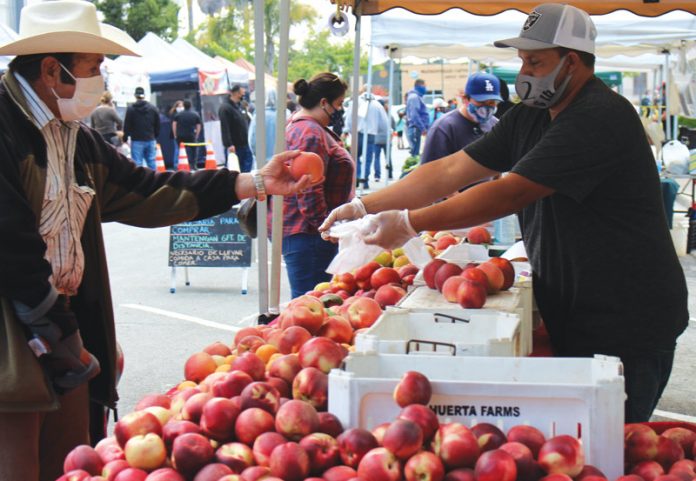
Grocery shopping is a different experience than what it was before the Covid-19 pandemic. Between long lines and being in close-quarters, navigating an indoor store can be a challenging and not altogether comfortable experience.
This is why many farmers markets across the Monterey Bay campaigned early on in the pandemic to remain open. Outdoor markets, organizers urged, were a safe alternative for people to purchase healthy food from local sources.
The push succeeded, with both state and regional leaders dubbing farmers markets “essential food sources” for communities. And despite ongoing challenges, they have seen a surge of support.
“Customers have gotten on board, which we really appreciate,” said Catherine Barr, Executive Director of Monterey Bay Certified Farmers Markets. “A lot of our farmers used to sell to restaurants… so they’ve lost a lot during this time.”
Monterey Bay Certified Farmers Markets oversees a handful of markets in the southern part of Monterey Bay, as well as the Aptos Farmers Market at Cabrillo College, which is open Saturdays 8am-12pm.
“Aptos… is doing pretty well,” Barr said. “Growers have been inventive—they’ve gotten together and created more Community Supported Agriculture programs, put together grab-and-go containers… They are thinking outside the box.”
The Watsonville Certified Farmers Market, open Fridays 2-7pm, is also thriving. Market manager Jesus Madrigal said that his main goal has been to make sure people feel safe—and so far, the response has been mostly positive.
“Of course there are still people who are concerned, and we’re trying to hear them out and voice these things to the City,” he said. “But overall, we are doing well.”
At the start of the pandemic, the Watsonville market was shut down temporarily. Madrigal was worried for his vendors, many of whom are small family farms. He began looking for other ways to help them sell their produce. Thankfully, it wasn’t long before the City allowed him to reopen the market, albeit with new guidelines.
Both the Watsonville and Aptos markets have been enforcing masks and physical distancing, as well as providing hand washing stations and sanitizer. Madrigal said that Cabrillo has allowed the market to expand onto its Watsonville campus, allowing vendors to space further apart.
Watsonville also continues to support programs such as WIC and CalFresh. A recent grant from The County of Santa Cruz has allowed the market to double people’s CalFresh funds—something the market was maintaining out of pocket in April.
“[The grant] has been a big help,” Madrigal said. “It is so important, during times like these, to make sure people have access to good food.”
Despite the positives, market organizers still recognize that many of their farmers are struggling. Barr said that some farmers do not see much of a future beyond the pandemic, whether it be due to low sales or diminishing labor.
“A couple of [growers] said that they might not be able to come back,” Barr said. “And that breaks my heart. Of course we’re all hoping for the best, but we’re preparing for the worst. All we can do is show our support to these hard working farmers.”












